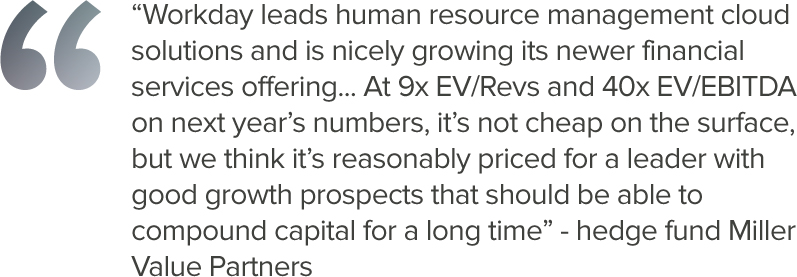
Thursday, August 27, 2020
Workday share price: what to expect from Q2 earnings
تم إعداد هذا المنشور من قبل سنشري للاستشارات


Workday’s [WDAY] share price had risen by nearly 70.4% to 25 August since bottoming out on 18 March at $113.87.
The maker of human resources software has been boosted in recent months by the growing need for cloud-based services as COVID-19 continues to affect businesses around the world. Workday’s share price gained by 17.6% for the three months ending July. In August, in the build up to its upcoming earnings, the share price has gained just shy of 7.3% to sit at $194.03 on 25 July.
Will Workday’s share price continue to work hard following its second-quarter earnings report, due 27 August?


What happened in Q1?
According to Workday CEO Aneel Bhusri, “organisations leaning on Workday to pivot” have been key to putting the company in a strong position during 2020.
Workday posted mixed results for Q1, which it reported on 27 May. Although sales beat analysts’ consensus expectations, the company missed on earnings per share.
Earnings rose 2% to $0.44 a share, despite missing expectations. Meanwhile, revenue climbed 23% to $1.02bn.


Workday’s share price rose by 7% in after-hours trading despite mixed earnings. The stock rose on the news that Workday would partner with Salesforce [CRM] and Microsoft [MSFT].
“Workday customers will be able to run Workday Adaptive Planning on the Microsoft Azure cloud” CNBC reported on the day. “Workday is also working with Salesforce to develop applications that will help businesses more easily return to work.”
Although Workday has a clear long-term plan focused on growing cloud ecosystems, it reduced its 2021 subscription revenue guidance. The company expects those sales to come in between $3.67bn and $3.69bn in fiscal 2021.
What to expect in Q2?
Wall Street expects a year-over-year increase in earnings on higher revenues for Workday’s Q2 results, according to Zacks Equity Research.
Quarterly earnings are expected to come in at $0.65 per share, representing a 47.7% year-over-year increase. Meanwhile, revenues are expected to be $1.04bn, up 17.5% from the year-ago quarter.


Elsewhere, Investors’ Business Daily data has Workday down to earn $0.66 a share for the July quarter, with revenue coming in at $1.04bn. For full-year earnings per share, analysts at IBD expect a 20% rise for the fiscal year, which ends in January 2021.
The company itself said that it is likely to report a revenue of $913m to $915m for its Q2. The consensus EPS estimate for the quarter has been revised 9.58% higher over the last 30 days, according to Zacks. Over the last four quarters, the company has beaten EPS estimates three times.
Is Workday a buy?
Workday recently passed its average share price target of $190, according to BNK Invest. This should lead analysts to reassess what the company is likely to achieve in the coming months. Using Zacks data, BNK Invest has found that 14 analysts currently hold a strong buy rating on the stock, three a buy and 14 a hold. None consider Workday a sell although two consider it a strong sell.
Monness analyst Brian White maintained a buy rating on the stock on 21 August, and set a share price target of $215, which represents a 10% upside from its current share price of $192.


For its Q2 2020 investor letter, hedge fund Miller Value Partners highlighted Workday as a stock to watch.
“Workday leads human resource management cloud solutions and is nicely growing its newer financial services offering. It has a sizeable total addressable market, especially relative to its current market cap and revenues,” it noted in the letter, adding: “At 9x EV/Revs and 40x EV/EBITDA on next year’s numbers, it’s not cheap on the surface, but we think it’s reasonably priced for a leader with good growth prospects that should be able to compound capital for a long time."
Source: This content has been produced by Opto trading intelligence for Century Financial and was originally published on cmcmarkets.com/en-gb/opto
Disclaimer: Past performance is not a reliable indicator of future results.
The material (whether or not it states any opinions) is for general information purposes only and does not take into account your personal circumstances or objectives. Nothing in this material is (or should be considered to be) financial, investment or other advice on which reliance should be placed. No opinion given in the material constitutes a recommendation by Century Financial or the author that any particular investment, security, transaction or investment strategy is suitable for any specific person.
Century Financial does not endorse or offer opinion on the trading strategies used by the author. Their trading strategies do not guarantee any return and Century Financial shall not be held responsible for any loss that you may incur, either directly or indirectly, arising from any investment based on any information contained herein.
















